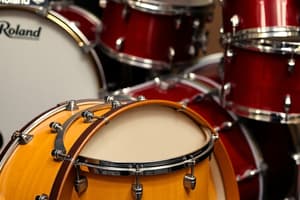Podcast
Questions and Answers
What role does sampling and sequencing play in drum and bass music?
What role does sampling and sequencing play in drum and bass music?
- They are used to create entirely new sounds from scratch.
- They are used to arrange pre-recorded sounds from other genres to create unique sounds. (correct)
- They are used as a way to copy the sounds of other genres.
- They are mainly used for rhythmic patterns and do not affect the melody.
How do melodic and harmonic elements often contribute to drum and bass music?
How do melodic and harmonic elements often contribute to drum and bass music?
- They provide the main rhythmic structure of the song.
- They add intensity and depth to the overall sonic atmosphere. (correct)
- They always take the lead role in drum and bass songs.
- They are not commonly used in this genre and are considered experimental.
What technologies and practices are typically involved in the production of drum and bass music?
What technologies and practices are typically involved in the production of drum and bass music?
- Digital audio workstations, synthesizers, and mixing/mastering techniques. (correct)
- Live recordings from performances.
- Primarily acoustic instruments and traditional recording methods.
- Exclusively sampling from older drum and bass tracks.
How does the role of DJs in drum and bass differ from other music genres?
How does the role of DJs in drum and bass differ from other music genres?
What is the cultural significance of drum and bass music?
What is the cultural significance of drum and bass music?
What is the typical tempo range, in beats per minute (BPM) for drum and bass music?
What is the typical tempo range, in beats per minute (BPM) for drum and bass music?
Which of these is a key characteristic that defines the rhythmic structure of drum and bass?
Which of these is a key characteristic that defines the rhythmic structure of drum and bass?
Which of the following genres is considered a direct predecessor to drum and bass?
Which of the following genres is considered a direct predecessor to drum and bass?
Which subgenre is characterized by smooth, melodic sounds within drum and bass?
Which subgenre is characterized by smooth, melodic sounds within drum and bass?
Which of the following is NOT a typical musical element of drum and bass?
Which of the following is NOT a typical musical element of drum and bass?
What is a common characteristic of 'breaks' or 'drum and bass' subgenre?
What is a common characteristic of 'breaks' or 'drum and bass' subgenre?
Which of the following is a characteristic focus of the 'Techstep' subgenre within drum and bass?
Which of the following is a characteristic focus of the 'Techstep' subgenre within drum and bass?
How does 'Neurofunk' incorporate different musical influences into its sound?
How does 'Neurofunk' incorporate different musical influences into its sound?
Flashcards
Sampling and Sequencing
Sampling and Sequencing
The process of selecting and arranging sounds from other musical genres to create new, unique sounds.
DJing in Drum and Bass
DJing in Drum and Bass
Using turntables and mixers to manipulate and blend music, a key part of drum and bass culture.
Drum and Bass Production Tools
Drum and Bass Production Tools
Digital audio workstations and synthesizers used to create and manipulate sounds in drum and bass production.
Mastering and Mixing
Mastering and Mixing
Signup and view all the flashcards
Sampling in Drum and Bass
Sampling in Drum and Bass
Signup and view all the flashcards
What is Drum and Bass (D&B)?
What is Drum and Bass (D&B)?
Signup and view all the flashcards
When and where did D&B originate?
When and where did D&B originate?
Signup and view all the flashcards
What is Breaks or Drum 'n' Bass?
What is Breaks or Drum 'n' Bass?
Signup and view all the flashcards
What is Liquid D&B?
What is Liquid D&B?
Signup and view all the flashcards
What is Techstep?
What is Techstep?
Signup and view all the flashcards
What is Neurofunk?
What is Neurofunk?
Signup and view all the flashcards
What is the role of the Bassline in D&B?
What is the role of the Bassline in D&B?
Signup and view all the flashcards
What is the role of percussion in D&B?
What is the role of percussion in D&B?
Signup and view all the flashcards
Study Notes
Key Characteristics of Drum and Bass
- Drum and bass (D&B) is a genre of electronic dance music characterized by a distinctive rhythmic structure.
- Its core elements typically comprise a fast, intricate drum pattern, and a bassline with a strong emphasis on sub-bass frequencies.
- Often features complex, percussive patterns across different ranges creating layers of texture.
- Frequent use of synthesizers and samplers to produce atmospheric soundscapes often supporting the rhythmic core.
- Tempo ranges typically 160-180 beats per minute (BPM), with variations.
- Often incorporates elements of breakbeats, particularly in its early forms.
Historical Development
- Drum and bass emerged in the late 1980s and early 1990s in the UK, primarily developing from the sounds of Jungle and hardcore techno.
- It built upon existing music genres, integrating their core elements to establish a distinct sound.
- Rapid growth to popularity in the 1990s fueled by the emergence of record labels and DJs who championed the genre.
- The evolution of drum and bass has witnessed various subgenres, each with unique sounds and aesthetics.
Subgenres of Drum and Bass
- Breaks drum and bass, characterized by using breaks from other genres and emphasizing tight percussion.
- Jungle drum and bass often incorporates a bass-heavy sound with slower tempos compared to other subgenres.
- Liquid drum and bass is characterized by a smooth, melodic approach.
- Techstep, focused on complex drum patterns and intricate percussive elements.
- Neurofunk, or neuro, incorporates elements of funk, soul, and other influences into its sound.
- Drum and bass styles such as 'dnb' and 'dubstep' are often considered influenced by the genre.
- Each subgenre often maintains the core D&B elements while offering distinct variations in melody, atmosphere, and mood.
Musical Elements
- Key rhythmic component: A complex drum pattern defines the genre's rhythmic core.
- Bassline: A critical component; a powerful, low-frequency bassline with complex melodic and rhythmic elements.
- Percussion: Multi-layered, intricate percussion patterns; complex hi-hats, kick drums, and snares are common.
- Synthesizers and samplers: Create atmospheric textures and soundscapes that enhance rhythmic and melodic elements.
- Sampling and sequencing: Used to create unique sounds by sampling and arranging sounds from other genres.
- Melodic and harmonic elements: While not always prominent, they contribute to the overall atmosphere; often used to add intensity and depth.
DJs and Production Techniques
- DJing plays a crucial part in shaping the genre; DJs often use turntables and mixers to manipulate music.
- Drum and bass production uses digital audio workstations (DAWs) and synthesizers, providing significant control over sonic features.
- Mastering and mixing are essential to fine-tune sounds and balance layers.
- DJs and producers frequently experiment with sampling to create new sounds and blend styles, enhancing the genre's evolution and uniqueness.
Cultural Significance
- Drum and bass has a strong cultural connection, especially within the dance music scene.
- The development of subgenres and specific styles reflects musical experimentation within the genre.
- This evolving musicality led to a wide appreciation from dance music audiences frequently attending music festivals.
- Visual elements in D&B music scenes are significant, creating a visual experience for the listeners.
Studying That Suits You
Use AI to generate personalized quizzes and flashcards to suit your learning preferences.





